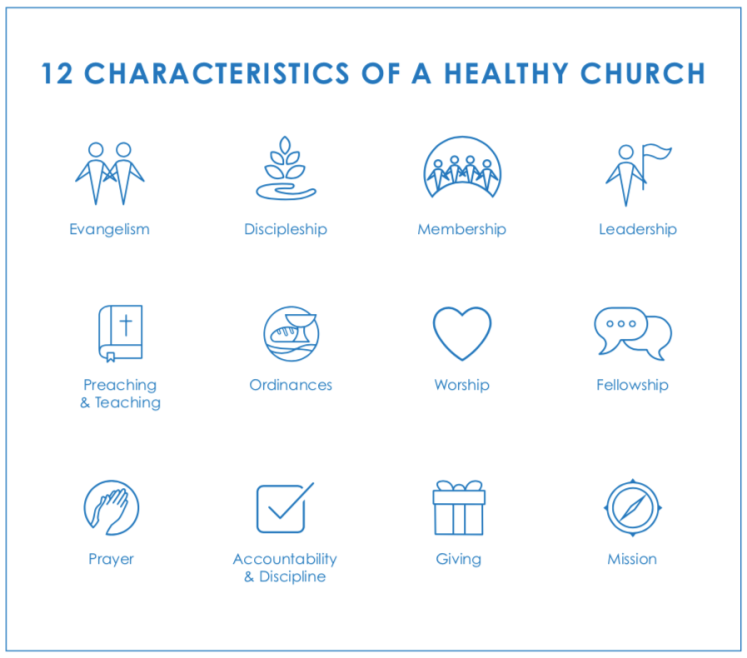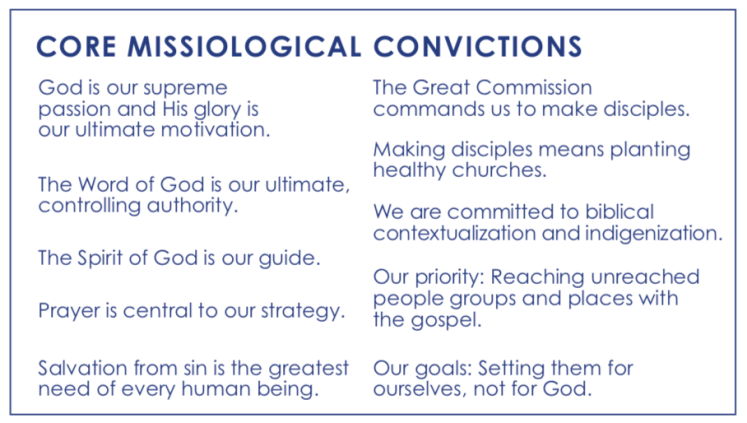GOSPEL – The gospel is the good news that the only true God, the just and gracious Creator of the universe, has looked upon hopelessly sinful men and women and has sent His Son, God in the flesh, to bear His wrath against sin through His substitutionary death on the cross and to show His power over sin and death in the resurrection from the grave so that all who turn from their sin and themselves and trust in Jesus alone as Savior and Lord will be reconciled to God forever.
EVANGELISM – Evangelism is the proclamation of the gospel in the power of the Holy Spirit with the aim of persuading people to repent and believe in Christ.
CONVERSION – Conversion is the divinely enabled personal response of individuals to the gospel in which they turn from their sin and themselves (repent) and trust in Jesus as Savior and Lord (believe).
DISCIPLE – Disciples are followers of Jesus. They have turned from their sin and trusted in Jesus as their Savior. They have died to themselves and surrendered their lives to Him as Lord. Christ now lives in them, transforming everything about them from the inside out. There are several marks of this transformation. The first, a transformed heart, occurs when a disciple places initial faith in Jesus. The rest are found in increasing measure as a disciple grows through faith in Jesus as a member of His body, the church.

DISCIPLE MAKING – Disciple-making is the Christ-commanded, Spirit-empowered duty of every disciple of Jesus to evangelize unbelievers, baptize believers, teach them the word of Christ, and train them to obey Christ as members of His church who make disciples on mission to all nations.
CHURCH – The definition of a local church from the Baptist Faith and Message 2000:
“A New Testament church of the Lord Jesus Christ is an autonomous local congregation of baptized believers, associated by covenant in the faith and fellowship of the gospel; observing the two ordinances of Christ, governed by His laws, exercising the gifts, rights, and privileges invested in them by His Word, and seeking to extend the gospel to the ends of the earth. Each congregation operates under the lordship of Christ through democratic processes. In such a congregation each member is responsible and accountable to Christ as Lord. Its scriptural officers are pastors and deacons. While both men and women are gifted for service in the church, the office of pastor is limited to men as qualified by Scripture.
The New Testament speaks also of the church as the Body of Christ which includes all of the redeemed of all the ages, believers from every tribe, and tongue, and people, and nation.”

CALLING – First and foremost, calling is the gracious act of God by which He draws people to become disciples of Jesus and members of His church. The call to salvation comes through the proclamation of God’s word in the power of God’s Spirit. Accompanying the call to salvation in Christ is a call to freedom, holiness, and suffering in Christ. The call to salvation forms the unshakeable foundation of a disciple’s primary identity now and forever.
IMB MISSIONARY – An IMB missionary is a disciple of Jesus set apart by the Holy Spirit, sent out from the church, and affirmed by the IMB to cross geographic, cultural, and/or linguistic barriers as part of a missionary team focused on making disciples and multiplying churches among unreached peoples and places.
MISSIONARY TEAM – A missionary team is an identifiable group of disciples who meet together regularly, care for each other selflessly, and partner with one another intentionally to make disciples and multiply churches among particular unreached peoples and/or places. In the New Testament, disciples on mission most often served on teams in which individuals had different roles and responsibilities. Scripture points to personal, practical, and pastoral reasons for disciples on mission not to serve in isolation. Even evangelistic reasons exist for disciples to exalt Christ in the context of Christian community. Consequently, IMB missionaries serve on teams in which individuals have different roles and responsibilities in the missionary task. Teams may be comprised of IMB missionaries, national believers, and/or other Great Commission partners. IMB provides multiple pathways through which missionaries may serve on one of these teams, each of which carries unique qualifications, involves various types of training, necessitates appropriate measures of accountability, and includes different levels of financial and/or other support from IMB.
UNREACHED PEOPLES AND PLACES – These are people groups and places where Christ is largely unknown and the church is insufficient to make Him known in its broader population without outside help. In contemporary terminology, unreached peoples refer to ethnolinguistic groups in which the number of evangelical Christians is fewer than 2 percent. Percentages are helpful but need to be seen alongside the state of the church and the progress of gospel work in each people group. The Bible, however, never mentions any particular percentage as the line between “reached” and “unreached.”
Moreover, while the people group theme is common in the Bible, missionary accounts in the book of Acts focus largely on the geography of unreached places instead of peoples, as New Testament missionaries carry the gospel to unreached cities. Furthermore, the gospel breaks through ethnic barriers as it impacts Samaritans, Gentiles, and the Roman centurion Cornelius. Therefore, both geography and ethnicity play a role in missionary deployment for the spread of the gospel, with unreached people groups being among the highest priorities.
